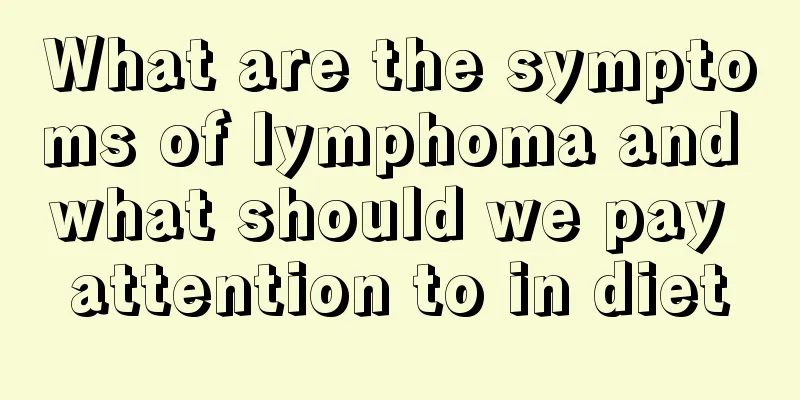What are the symptoms of lymphoma and what should we pay attention to in diet

|
What are the symptoms of lymphoma? What should I pay attention to in my diet? Lymphoma is a malignant tumor originating from the lymphatic hematopoietic system, which is mainly manifested by painless lymphadenopathy, hepatosplenomegaly, involvement of various tissues and organs throughout the body, fever, night sweats, weight loss, itching and other systemic symptoms. According to the tumor cells, it can be divided into non-Hodgkin's lymphoma and Hodgkin's lymphoma. The cause is still unclear. It is generally believed that it may be related to gene mutation, infection with viruses and other pathogens, radiation, chemicals and autoimmune diseases. The symptoms of lymphoma are localized and systemic, with the following specific features: 1. Local characteristics: including superficial and deep lymph node enlargement, which are mostly painless, smooth in surface, movable, tough, full, uniform, early active, neck, axilla, groin, late fusion, skin adhesion, no activity or ulceration; pharynx, tongue root, tonsils, nasopharyngeal mucosa, mucosa is rich, forming a pharyngeal lymphatic ring, also known as Waldeyer's ring, which is a good site for malignant lymphoma. 2. Systemic manifestations include: Systemic symptoms: Malignant lymphoma may present with fever, itching, night sweats, weight loss and other systemic symptoms before or at the same time as lymphadenopathy. Skin lesions: Patients with malignant lymphoma may have a series of non-specific skin manifestations, including polymorphic skin lesions, erythema, blisters, erosions, etc. Patients with advanced malignant lymphoma have low immunity, and skin infections rupture and exude for a long time, resulting in scattered skin thickening and desquamation throughout the body. What should you pay attention to in your diet for lymphoma? The diet should be regular and quantitative, and eating small and frequent meals is more suitable for patients with digestive tract cancer. Eat more vitamin foods, green vegetables and fruits. Eat foods that can inhibit carcinogenicity, such as cabbage, cabbage, carrots, garlic, vegetable oil, fish, etc. Do not eat salt, smoked, grilled and fried foods, especially burnt ones. Adhere to a low-fat diet and eat lean meat, eggs and yogurt regularly. |
<<: Early symptoms of lymphoma
>>: Early symptoms of breast cancer
Recommend
What does hug reflection mean
The hug reflex is a medical term and a common unc...
What to do for acute enteritis? These methods tell you
Acute enteritis is a common digestive system dise...
Answers to your questions about the clinical manifestations of colon cancer
The occurrence of colon cancer has some impact on...
What are the treatments for lung cancer? Four major professional treatments for lung cancer
Expert introduction: For patients with early and ...
What to do if there is too much toxins and moisture
If there is too much moisture in the body, it wil...
How to effectively treat herpes on the mouth
Herpes on the mouth is a type of cold sore, which...
What are the symptoms of non-gonococcal urethritis?
Some friends may not be familiar with the term no...
What are the consequences of drinking alcohol
Alcohol is quite common in people's daily lif...
Don't over-treat thyroid cancer
Thyroid cancer is a malignant tumor that originat...
Spinal cord injury classification method
The levels of spinal cord injury are divided into...
How to relieve depression
There are many people with depression in life. Mo...
Is percutaneous interventional treatment useful for advanced liver cancer? It has a certain effect
Percutaneous interventional treatment for advance...
What factors can lead to gastric cancer
The cause of gastric cancer is still unclear. It ...
How to lose weight if your face is fat
Nowadays, many people like to watch TV and eat sn...
How to massage breasts to make them bigger, you need to know these two acupoints
With the trend of society, many women want to hav...









